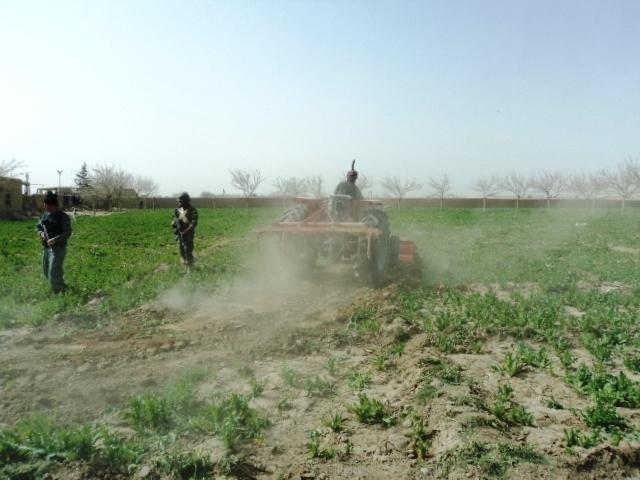KANDAHAR CITY (Pajhwok): Counter-narcotics officials in southern Kandahar province have linked an end to poppy cultivation to the economic well-being of farmers.
They say as long as the financial situation of growers does not improve, it will be difficult to control poppy cultivation in Kandahar.
On the other hand, farmer argue they have to grow poppies as a last option because other crops need more water and there is no market for their produce.
In the past, the illicit crop was cultivated once a year but now it is grown two, three or even four times in parts of the province.
Complaints of farmers
Former says they know the negative effects of the illegal crop but have no option but to grow it.
Mohammad Jan, a grower from the Shah Mir Kala area of Maiwand district, said: “We know poppy growing is prohibited but we have no other option.
“Water for other crops isn’t adequate and our produce have no gainful market,” he complained. While other crops need freguent irrigation, poppy requires less water and fetches more money.
He added in the past there were 360 karez wells in Maiwand but all of them had gone dry. Farmers have to dig deep wells and extract water at a high cost.
Jan said an individual could easily get loans for the cultivation of the poppy crop. Farmers do not need to search buyers for the opium as customers themselves approach them.
He said the lack of water and market for other agriculture produce was the main reason behind the increasing cultivation of poppy.
Government officials
Counter-Narcotics Director Gul Mohammad Shakran said there was need for drastic changes in farmers’ lives to control the cultivation of the illicit crop.
He told Pajhwok Afghan News one major problem of farmers was the non-availability of water resources.
He explained most of the poppy crop was cultivated in insecure areas, far from Kandahr City where the irrigation system was nn-existent.
He added mafia groups exploited the farmers’ economic vulnerability. It was hard for government to eliminate the cultivation of poppy and provide an alternative to growers, he admitted.
Assistance from international community was vital to the elimination of poppies, stressed the director, who stressed the need for joint efforts to halt poppy cultivation, production and smuggling.
Agriculture Director Syed Hafizullah Syedi suggested the same strategy to halt poppy cultivation.
He said the introduction and support of saffron, pistachio, olive and almond crops offered an alternative to poppies.
Syedi added the Agriculture Ministry had launched a three-year project of 250 pistachios, as many saffron and tens of raisins farms in nine districts of Kandahrar some weeks back.
The project is being implemented in Zherai, Panjwai, Maiwand, Daman, Dand, Takhta Pul, Spin Boldak, Maroof and Arghistan districts.
The project, financially supported by the United Nations and European Union, may help control poppy cultivation in the province.
Public Health that needs to be addressed urgently.
He said the most dangerous news was that due to drug addiction 102 people had been diagnosed with AIDS in Kandahr. In addition, there is no proper facility for the rehabilitation of addicts.
Mohammad Nabi, who treats drug addicts, said more people had become addicted to drugs. Most of the addict hail from far-flung areas and are illiterate.
In some cases, the junkies have also made their wives addicts. Nabi added of 120,000 drug addicts, 10 percent were women.
Residents & civil society activists
Ahmad Shah Sayar, a civil society activist, said according to statistics from the Counter-Narcotices Department, 50 percent of Afghanistan‘s poppy was cultivated in Helmand, Uruzgan, Kandahar and Farah.
He called widespread poppy cultivation a threat to Afghanistan and the wider region. Sayar said if the number of three million addicts in the country was true, each one spent $1 on buying drugs. It is a big loss to the economy.
Residents said the cultivation of poppy and use of opium represented a knotty problem for the Afghan society, which was already facing a whole host of other issues.
Taj Mohammad, a resident of Kandahar City, said his brother had been addicted to drugs. Despite repeated rehabilitation, he could not quit narcotics.
Mohammad said his brother initially started using hashish with friends. In the next step, he started to consume other drugs. The number of rehabilitation centres in Kandahar City is insufficient.
Taj added there was need for slandered drug rehabilitation centres in Kandahar at the zonal level. He called for intoducing new techniques to prevent rehabilitated individuals from relapsing into addiction.
Security Officials:
Col. Muhsenullah, in charge of counter-narcotics police, in Kandahar said efforts had been stepped up to prevent smuggling of drugs and more security arrangements had been made in airports and dry ports of the country.
He said 53 big and small smugglers had been arrested and referred to the attorney office for investigation this year.
The poppy eradication drive this year could no completed while the illicit crop was grown on 40,000 hectares of land. The counter-narcotic department could flatten only 72.5 acres crop of poppy.
Ten percent increase noticed in the growing of poppy in the county this year.
nh/mud
Visits: 5









GET IN TOUCH
NEWSLETTER
SUGGEST A STORY
PAJHWOK MOBILE APP